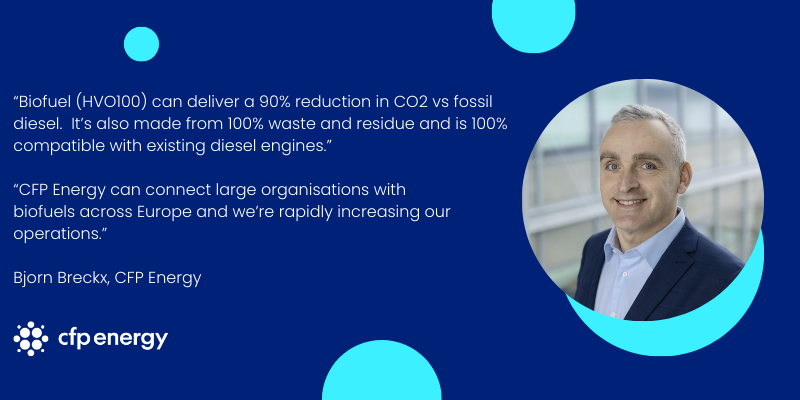We're exhibiting at E-World | Register & Secure your Meeting
Germany, Essen | 11-13 February
Germany, Essen | 11-13 February
17 October 2024
George Brown

CFP Energy is a supplier of biofuels and more specifically hydrotreated vegetable oil (HVO) across Europe, providing large-scale organisations with the direct fuel supplies to maintain operations while reducing their impact on the environment.
HVO offers a viable alternative to fossil fuels, providing just as much energy but without the intense levels of carbon emitted into the atmosphere.
"This is a critical moment for large scale organisations across Europe and the UK as carbon regulations are set to get significantly tighter year-on-year. Simply put, businesses will have no choice but to transition to biofuels and HVO in the near future, which is why it is essential for the transition process to start sooner rather than later."
Bjorn Breckx, HVO Specialist
According to a study carried out in Bilboa, Spain, a clear difference was recorded when HVO fuels were used to power public transport within a densely populated area.
“The registered CO2 emissions and calculated mass, volumetric and energy fuel consumptions were lower when using the renewable fuel, despite the lower volumetric heating value compared to fossil diesel fuel, which is partly attributed to the lower EGR rate with renewable fuel that leads to a higher energy efficiency. Additionally, CO and THC emissions coming from the combustion process of renewable fuel are lower than those of the fossil fuel, given the paraffinic structure of renewable fuel that favours a cleaner combustion.” (Performance and regulated emissions from a Euro VI-D hybrid bus tested with fossil and renewable (hydrotreated vegetable oil) diesel fuels under urban driving in Bilbao city, Spain)
In this guide, a general overview will be provided of the many applications of biofuel and uses of HVO fuel, demonstrating how your organisation could benefit in the short and long-term future.

If you would like to begin your HVO fuel transition, our team can provide rapid access across Europe, click here.
Hydrotreated Vegetable Oil (HVO) fuel is rapidly gaining recognition as a versatile and sustainable alternative to conventional diesel.
Derived from renewable sources such as used cooking oils and animal fats, HVO offers a range of benefits, including significantly lower greenhouse gas emissions and improved fuel performance.
As the push for greener energy intensifies, various sectors are finding innovative ways to integrate HVO fuel into their operations.
The road transport sector is one of the most significant consumers of fossil fuels, and consequently, one of the largest contributors to greenhouse gas emissions. HVO fuel offers a practical and immediate solution for reducing the carbon footprint of vehicles, without the need for costly modifications or infrastructure changes.
Many logistics and transport companies are switching to HVO to power their fleets, enabling them to reduce emissions while maintaining the performance and reliability of conventional diesel. In the UK, companies like Tesco and UPS have successfully incorporated HVO into their operations, significantly reducing their environmental impact.
Several cities across Europe, including London, have adopted HVO fuel for buses and other public transport vehicles. This transition not only helps in meeting emission reduction targets but also improves air quality in urban areas, benefiting public health.
As highlighted in the same report referenced in the introduction of this feature, HVO has a proven impact on reducing carbon emissions and even the performance of engines.
“The change from fossil to renewable fuel increases the efficiency more than the whole energy recovery system of the vehicle. This larger efficiency is consistent with the smaller EGR ratio found for the renewable fuel, but this fuel allows for such operating conditions within the normative limits, indicating that the use of renewable fuel provides EGR reduction margin.” (Source)
The construction, agriculture, and mining industries rely heavily on diesel-powered machinery and equipment. HVO fuel is proving to be a valuable alternative in these sectors, offering the same power and efficiency as traditional diesel while reducing environmental impact.
Construction sites are major sources of CO2 emissions, particularly due to the use of heavy machinery. In the UK, construction companies are increasingly adopting HVO fuel to power diggers, cranes, and other equipment, helping to minimise their carbon footprint. For example, Skanska UK has implemented HVO fuel across several projects, contributing to their goal of achieving net-zero carbon emissions by 2045.
Farmers are also turning to HVO fuel to run tractors, harvesters, and other agricultural machinery. The use of HVO not only supports sustainability goals but also ensures compliance with increasingly stringent environmental regulations. In rural areas, where machinery often operates far from refuelling stations, HVO’s longer shelf life and stability offer practical advantages.
The marine and aviation sectors are traditionally challenging when it comes to reducing emissions due to the high energy demands and long operational hours. However, HVO fuel is emerging as a feasible alternative, particularly for smaller vessels and short-haul flights.
HVO fuel is being adopted by both commercial and leisure vessels. In the UK, some ferry operators are exploring the use of HVO as a means to reduce their environmental impact while ensuring reliable service. The reduced particulate emissions from HVO also contribute to cleaner air in port cities and coastal areas.
While the aviation industry is still largely dependent on kerosene, HVO is being explored as a sustainable aviation fuel (SAF) for smaller aircraft and short-haul routes. Some airports in Europe have started using HVO for ground support equipment, further integrating renewable fuels into their operations.
In addition to transportation, HVO fuel is increasingly being used for power generation, particularly in backup generators and off-grid applications. Its ability to provide reliable, on-demand power while producing fewer emissions makes it an attractive option for various industries and facilities.
Data centres, hospitals, and other critical infrastructure require reliable backup power in case of grid failures. HVO fuel is being adopted for standby generators, offering a greener alternative without compromising reliability. In the UK, companies such as Vodafone have begun using HVO for their backup generators, contributing to their broader sustainability strategies.
In remote locations where access to the national grid is limited or non-existent, HVO provides a sustainable solution for power generation. Whether for remote communities, construction sites, or exploration projects, HVO-powered generators can supply the necessary energy while minimising environmental impact.
Beyond its use in engines and power generators, HVO fuel is also being utilised as a heating fuel. This is particularly relevant for buildings and industrial processes that still rely on oil-fired heating systems.
In rural areas of the UK where access to natural gas is limited, HVO is being explored as a replacement for heating oil in domestic boilers. Trials have shown that HVO can reduce CO2 emissions from home heating by up to 88%, making it an attractive option for households looking to reduce their carbon footprint.
HVO is also being used in industrial boilers and furnaces, providing a renewable alternative for processes that require high-temperature heat. This application is particularly beneficial for industries such as food processing and manufacturing, where reducing carbon emissions is a growing priority.
Sourcing and implementing new fuel sources is a major operational challenge and there are numerous hurdles to overcome if a successful fuel transition takes place.
As industry specialists and supply operations across Europe, CFP Energy has the resources and expertise to deliver a comprehensive fuel transition, providing your with clarity and confidence every step of the way.
We will ensure your commercial operations remain fully active throughout the process, providing you with a clear path to a greener and profitable future.
As you now understand, HVO fuel’s versatility and sustainability make it a key player in the transition to a greener future. Its wide range of applications, from road transport to power generation and heating, demonstrates its potential to reduce emissions across various sectors.
As more industries recognise the benefits of HVO, its adoption is likely to accelerate, helping to drive Europe—and the world—towards a more sustainable energy landscape.
Make sure you are at the heart of that change, with CFP Energy, here.
On November 28, 2024 the UK government launched a consultation on expanding the scope of the UK Emissions Trading Scheme to include the maritime sector from 2026.
Increased government ambition, tighter regulations, greater corporate sustainability commitments, and the outcome of the international COP process will demand serious net zero action from large-scale organisations over the next decade and beyond.
As the aviation industry navigates the first year of the Carbon Offsetting and Reduction Scheme for International Aviation (CORSIA) Phase 1 (2024–2026), this week’s approvals of additional carbon crediting standards have influenced the market landscape, introducing both opportunities and complexities.